Right leadership qualities are critical for success in life. Today we will go over 11 leadership qualities that can help you get closer to your goal!
“Some people are born leaders.”
It’s a bit of a myth. This only means that some people are born with extroverted personalities and self-confidence.
And this makes them more suited to a leadership role.
But that’s not to say you could give any “born leader” a leadership responsibility and see them excel at it. In fact, most of them would fail.
Like most things in life, there is a formula for leadership success. It isn’t often about having the “right personality” or knowing the “right people”. Becoming a great leader is down to adopting the right leadership skills.
This will offer an almost guaranteed pathway towards a fantastic leadership position.
Whether you want to lead a sports or hobby club, you’ve been offered a management position at work, or you’re hoping to become the leader of a brand new organization, you will make it. You just need the right mindset and the willingness to learn.
If you’re wondering, “what are the qualities of a good leader?”, read on. I have put together a leadership qualities list that should prove helpful to aspiring leaders.
Main Leadership Qualities
Let’s have a look at some of the main leadership traits that you can improve in yourself.
Confidence
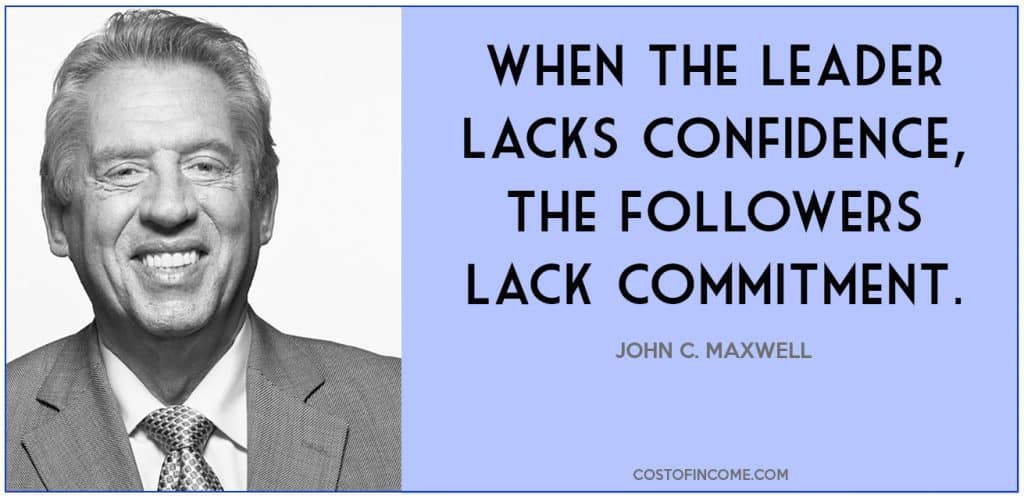
I know what you’re thinking: but you just said that confidence doesn’t mean you’ll excel at a leadership role. And that would be true – having confidence alone will not make a great leader.
But when combined with the other 11 essential leadership qualities, it truly will. And having no confidence in yourself or others will get you nowhere.
It’s incredibly important to be able to make decisions with purpose and certainty. Confidence is one of the key characteristics of a leader.
For a start, you need to gain the trust of those you are leading. You’ll find it very hard to build a loyal following and to be respected and accepted by that following if you don’t seem sure about what you’re doing.
Of course, there may be times when you’re genuinely not sure about what you’re doing – we’re only human, after all. But you can at least be confident that your proposed plan of action is the best thing you can do at this moment.
Gaining confidence is something that can’t be achieved overnight. Most often, you will need to follow the well-known phrase and fake it ‘til you make it.
Learn how to face the things that scare you and step out of your comfort zone. Do it with true faith in your ability to handle any situation. This will help you to build confidence as you realize that you are quite invincible.
Many people suffer from a lack of self-assurance because they’re worried. Worried that they can’t do the things that scare them. This is rarely true in reality.
You also need to have confidence in other people to be a good leader. You may reach a time when it would be silly, impossible, even, to try and juggle all your leadership tasks alone.
In such a situation, you would need to put your trust in others. Believe in their ability to carry out a job at your standard. Instead of taking on an arrogant, “Only I can do this” sort of attitude, allow yourself to believe that others are just as capable as you.
Humility
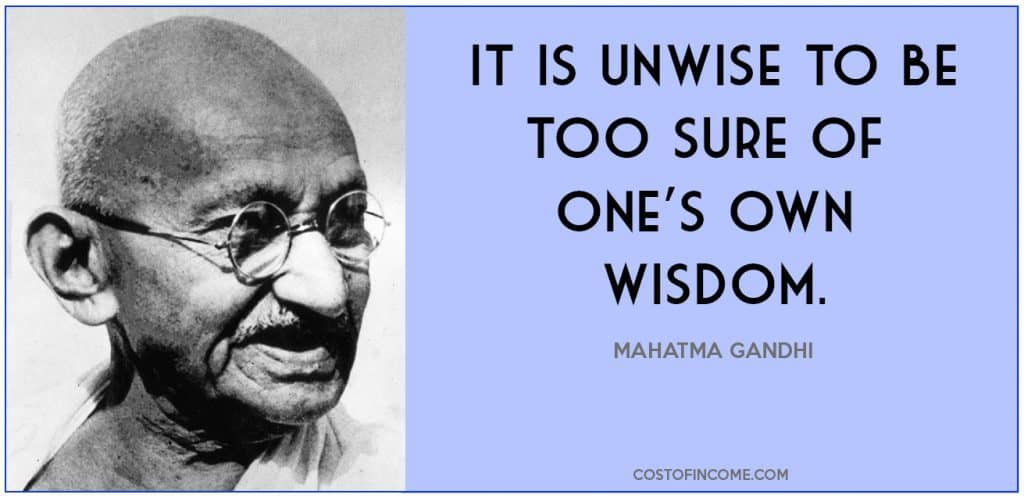
Most of us don’t stop to consider the meaning behind the word “humility”. We might say that we feel humiliated when something embarrassing happens to us. But having humility is actually quite different.
If you manage to lead without pride or arrogance, you are open to admitting when you are wrong, and you’re humble in what you do, then you have the essential leadership quality of humility.
Humility is key for your growth as a leader. If you can’t even face up to the fact that you have done something that, on reflection, probably wasn’t right, then how are you supposed to learn from your mistakes and move forward?
Having humility doesn’t mean you’re weak. It just means that you’re hyper-aware of your role as a leader at all times.
Also, you’re able to step back and consider why your actions may have had negative implications on yourself or others around you.
You, as a business leader, will be far more respected by your peers if you show a little humility. Nobody likes an egomaniac. Think twice before you assume that you’re better or more entitled than those around you.
Even the most successful entrepreneurs hit stumbling blocks. Some may even fall down. But the difference between a true leader and one who isn’t is simple.
A true leader will pick themselves up and vow to learn from their mistakes.
Communication
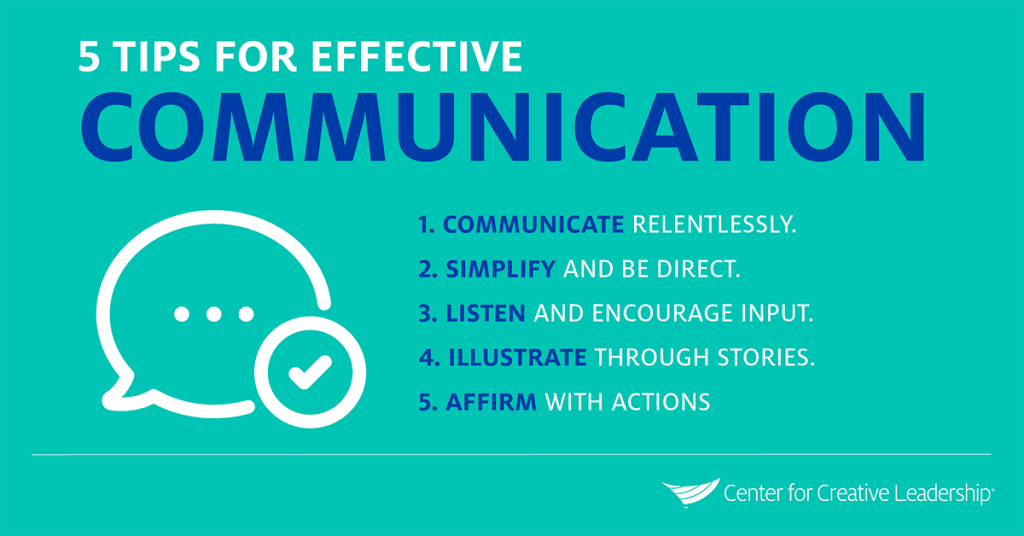
Being a leader means, in some sense, being able to act alone. But communication is still one of the most essential leadership qualities.
Communication refers to any time that you use your voice (or your metaphorical voice, if you are using an online platform) to provide information to another person or body of people.
As a leader, communication is unavoidable. Thus, knowing how to communicate properly is key.
Let’s take building a business strategy. You can use communication at many stages throughout this process. It is one of the good qualities of a leader that you should aspire for.
You, as the leader and central information provider, have the most important role of them all.
Any information you communicate to those around you needs to make sense. It should be obvious what you are trying to achieve from the information you provide.
Those you are communicating to should understand you completely.
On a more basic level, communication also refers to general conversation and pleasantries you exchange with your peers. The way you communicate will paint a picture of the person you are to anyone you communicate with.
People are always more likely to remember bad interactions than good. That’s why it’s common for bad reviews to crop up frequently on sites like TripAdvisor.
So the way you present yourself externally is something to keep in mind. Of course, we all have bad days. But learning to keep your personal issues to yourself will help you to gain more long-term respect from your peers and should become a part of your leadership qualities.
Patience
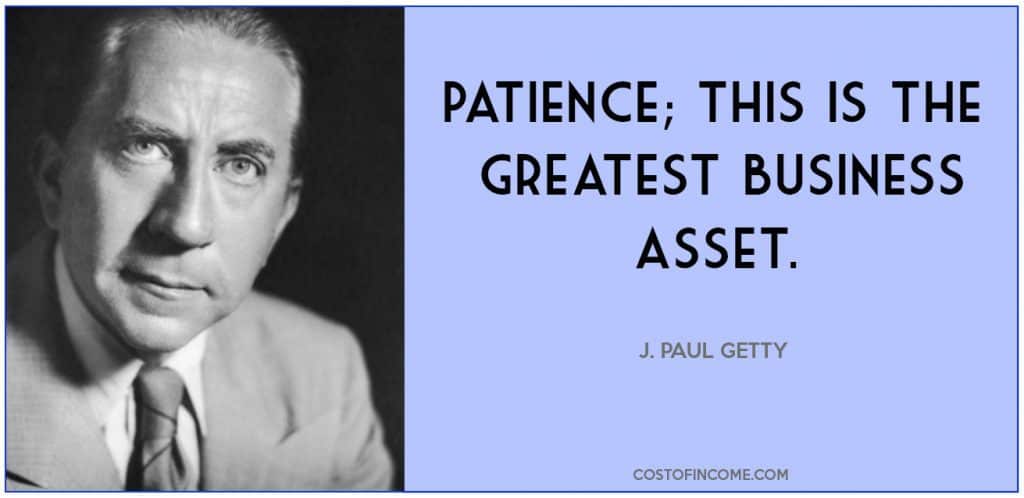
Too many people take on the role of a leader because they expect to see immediate change. In the majority of cases, patience is one of the qualities of a good leader that will help you to accept that change takes time.
Success (or improvement) doesn’t happen overnight, and it can take years and years to build your empire.
Just ask the most successful leaders of today: any of them will tell you that the idea of “instant success” doesn’t exist.
Having patience doesn’t mean that you can’t have a goal. Just make sure that the goal is realistic, and that you have a sensible means in place to achieve it.
A patient leader understands that they may not ever achieve their vision. But they can try their best, reviewing their actions and changing their behavior when necessary.
Expectations, though they may seem harmless enough, are actually damaging to a leader. More often than not, skewed expectations lead to disappointment.
This then leads to frustration and despair. Instead of bemoaning about why something hasn’t worked out like you thought it would, set your sights lower. Or better, banish your expectations completely.
Throw in some realism, which will help you paint a better picture of what your future as a leader will look like.
Of course, being patient with others is just as important as being patient with yourself. No-one will want to work with you if you’re hot on their backs, demanding for a response a request that you only made a day ago.
It’s fine to set deadlines, but make sure they’re fair for everyone.
Passion
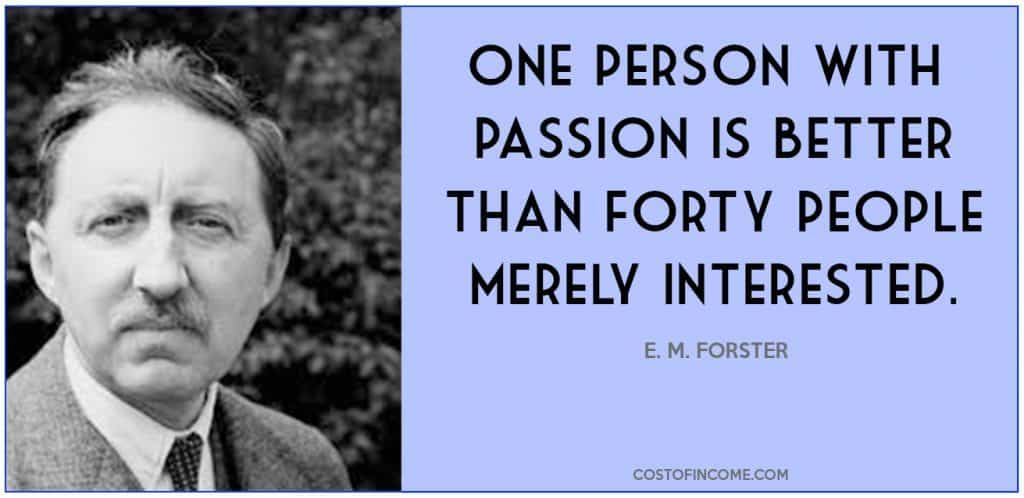
If you want to become a leader just for the power the role holds, you won’t get very far at all. The most successful leaders are passionate about what they do.
This is why passion is one of the good leadership qualities that all leaders should display. Ask yourself this: if you don’t care about whatever it is you’re leading, why are you even in your position?
If you’re only there for the money or the status, you’re going to end up miserable if you aren’t already.
Only a leader who loves what they do can succeed. This doesn’t mean plastering a sunny smile on your face when you don’t feel like it. We all have bad days, of course.
But being able to ride out the rough times in the knowledge that the job you love will get easier is a key skill to have.
Passion equals productivity. Think about it: the jobs you don’t feel passionate about, like cleaning your toilet, for instance, are probably the jobs you put off the longest.
The jobs you love, however, are the ones you approach with vision, enthusiasm, energy, and excitement.
When you’re passionate about something, you’ll inspire others to share your passion with you.
Integrity
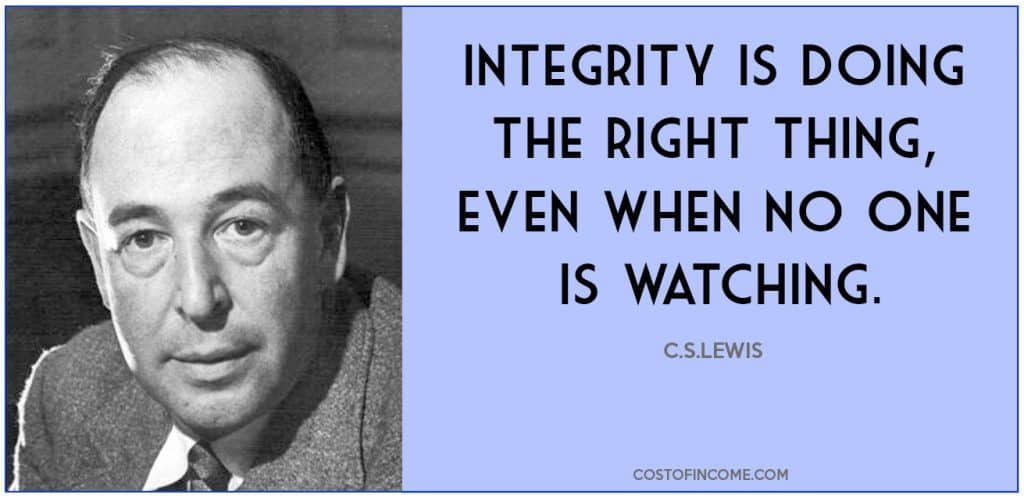
Integrity is the practice of having strong moral principals and being honest at all times. This trait is one of the most essential leadership characteristics to have if you want to succeed in managing others.
It’s important to stand up for what you believe in and refuse to compromise on your principals. Especially when you know, in your heart of hearts, that you hold them for the right reasons.
Many great leaders credit their integrity for their success in their field.
Leading with integrity means doing something because it’s the right thing to do. Not because you’ll get some sort of benefit from it, or because it’s the “easy way out”.
A leader with integrity makes promises that they can keep, knowing how valuable it is to build trust. You may have to make some promises reluctantly, but this is all part of gaining true faith and respect as a leader.
Knowing the truth and admitting to the truth are two separate things. While you may not like the truth all the time, having integrity is having the strength and the bravery to face up to it.
You should do this instead of hiding from it (or covering it up) in fear. This is one of the attributes of a good leader.
It’s always better, to be honest than to make delusional statements that confuse others into believing something that isn’t factual.
Even if it means risking damage to your reputation, integrity is key. Equally important is being able to question your own assumptions or decisions and admit that you could be wrong.
There’s a difference between refusing to compromise on your principals and refusing to see another person’s viewpoint.
Charisma
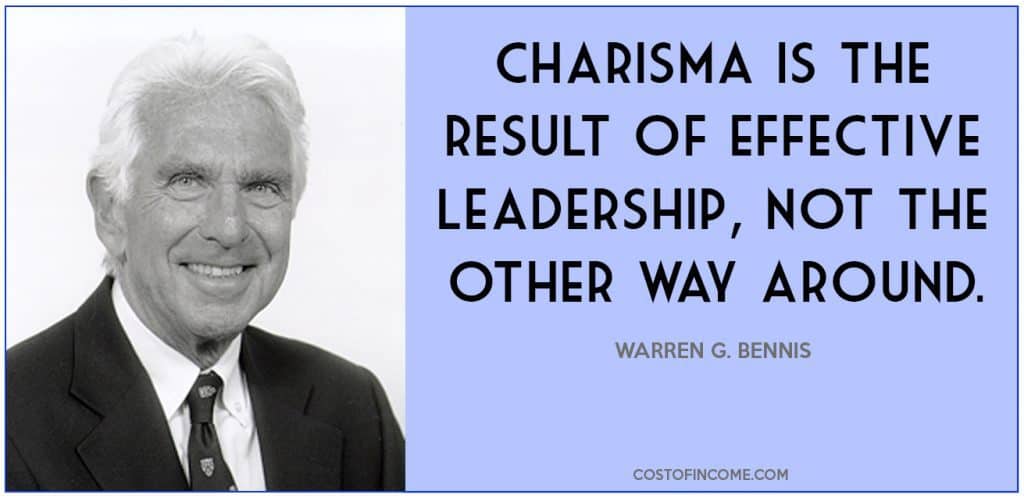
What do all your favorite leaders have in common? There’s most likely quite a lot of things you could list, but what’s for certain is that they’ll all have plenty of charisma.
Your favorite leaders can walk into a room and capture the attention of everyone in it with a few well-spoken words.
They can make people laugh at the right times, and can equally incite anger, passion or disgust based on whatever they have to say.
Leaders with charisma have much more than “charm”. They can make other people feel good, and can even make people feel special to have received their attention.
They can get people on their side. This is useful when they’re proposing a new product, service, or concept for use by those around them.
When you have charisma, you know how to put people at ease. You can learn how to do this through your behavior, body language, and even the tone of your voice.
You should be able to regulate your own emotions. This way, when you’re sad, angry, or short of patience, it doesn’t affect your charismatic personality. If you’re trying to win people over, they don’t want to hear about the argument you had with your wife or your frustrating commute to work.
They want to know how you or your business can solve a problem or offer them something incredible.
You can only take on a charismatic persona when you’ve mastered confidence. So, if you know you still have to work on your own self-assurance, start there first. You need a certain level of faith in yourself to be able to work a room in your favor.
This will help you to become a good leader having one of the key leadership qualities.
Trust
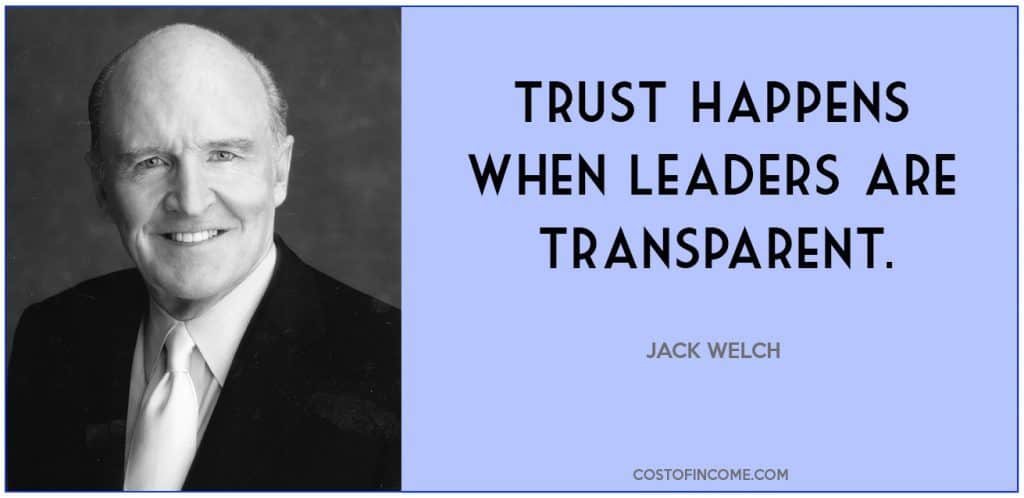
Part of being a leader is being able to delegate tasks to others. This works better than trying to juggle everything yourself. Thus, trust is one of the essential leadership qualities to adopt today. There are significant consequences of distrust.
Those below you will feel that they can’t contribute their own opinions, offer help when you may need it, and even question your decisions.
If you’re not trusting by nature, it may need to be something you work on in your quest to become a great leader. Trust is an emotional connection between several people.
While it can take time to build, it’s possible to trust those who will help you or your business to blossom.
Take a look at your past. Have you ever had somebody abuse your trust, either at work or in your personal life? Has this led you to put your guard up? Instead of seeing a previous instance of broken trust as a reason to never trust again, look at how you can learn from it. There are always things you could take from the experience.
For every person who abuses your trust, you have new signs to look out for to prevent it from happening in the future.
Ultimately, trusting others in their responsibilities around you will help you to grow as a leader. Not only are you freeing yourself up of valuable time by delegating tasks out to others, but you’ll also improve the self-worth of others.
You can do this by letting them have their say (and actually taking their words into account). Allowing them to feel like they matter to you or your business will also help.
Positivity
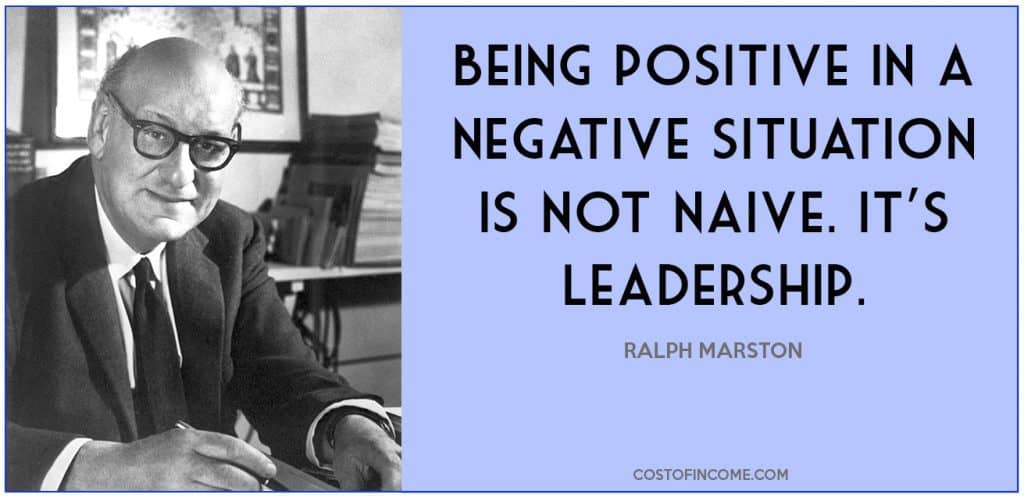
As a leader, your role is to find the positives in a bad situation. Even when you’re struggling to believe them yourself. Business, like life itself, has its ups and downs.
To expect everything to be plain sailing would be unreasonable. To stay positive as a leader, you need to understand that there may be difficult times ahead.
Yet, you will overcome them, as you have done in the past.
The first step towards developing a positive attitude is to get rid of your expectations. I mentioned this earlier. It’s fine to have goals, or even a business plan (in fact, a plan is vital for growth). But expectations and aspirations are two different things.
If you expect a certain reality that isn’t guaranteed, you’re set for a complete breakdown when things don’t work out as well as you hoped. Banish your expectations and start to look at things practically.
Only look forward to the things that are certain to happen, and anything else will come as a happy bonus.
If you thought you had planned something strategically, only for things to fall through at the last minute, don’t show it. Being the positive face of your community is essential for maintaining collective morale.
Not only do you have to pick your own self up and try to mend your damaged pride, but you also need to be able to lift up those around you who may have suffered this setback.
You should be able to inspire your team based on your behavior. Not only your achievements and accomplishments.
Research has even found that members of a team can mirror their leader’s behavior. So, perhaps positivity goes beyond boosting morale. Maybe it is also possible for you to behave in a certain way and have your team reflect that behavior. This, then, is an example of what makes one o key leadership qualities.
Vision

Having a clear, focused vision is one of the essential leadership qualities. You should definitely adopt it before you even become a leader. Most leaders start out with a vision of some sort.
They do this even before they develop the other attributes that make them so successful in the long run.
Knowing what you want will help you to establish your leadership role in the first place. And when you see your vision playing out, it may give you a “high”.
This is a feeling of elation, that things have actually gone to plan. But having a vision is far more than deciding one day, “I want to do XYZ”, then calling it quits when you manage to achieve it.
Vision is a long-term quality and will see you through many, many years of business.
Your main vision may stay the same, but as your team and your business growth, you may need to adopt several short-term visions. These will help you continue to succeed.
Having a vision doesn’t mean just putting a goal in place – it’s also about communicating that goal to your team. You should do this with keen decisiveness. You should also be open to new ideas.
Learn to be accepting of the fact that the visions of other people may actually work better for your business than your own.
Resilience
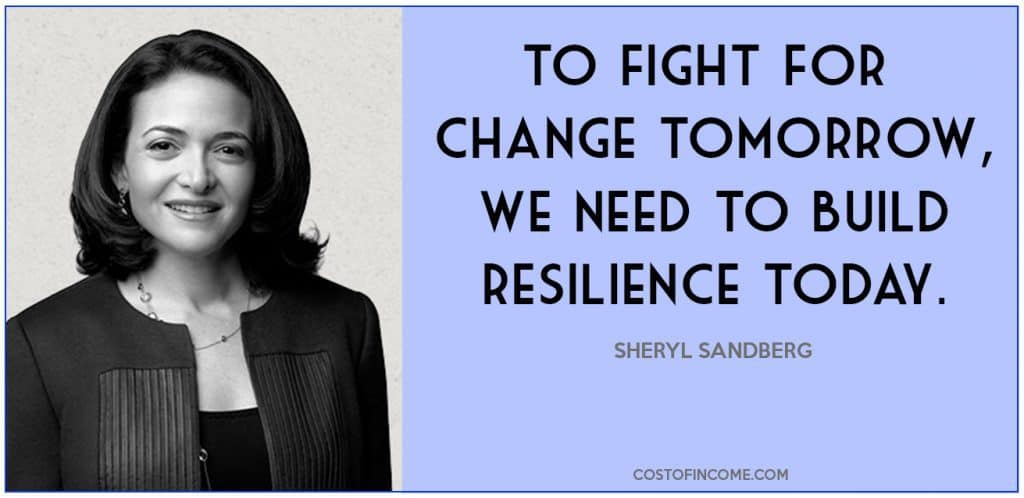
Finally, if you want your leadership position to stand the test of time, one of the essential leadership qualities you’ll need is resilience. Your journey to the top may be a long, slow one. It may take years, decades, even, to achieve the goal you first set out when you started.
You will more than likely face times of difficulty, and there may even be times when you can’t see a way out of a problem at all. The only thing that will save you in a situation like this is resilience.
Great leaders never give up. Even if they have to redefine their entire approach to thinking and working. Even if they must change their initial purpose to something completely different.
They’ll do it for the good of their business. The only way to maintain your leadership position over time is to be resilient, always.
What makes a good leader?
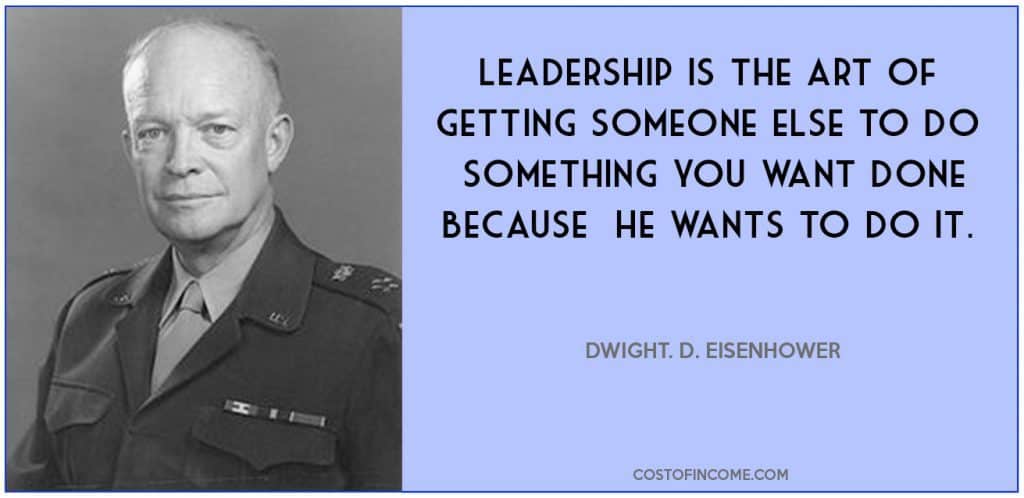
So, you know the leadership traits. Now you want to know what makes a good leader. Being a good leader is about finding the right balance between the essential leadership qualities.
There’s no point in having too much of one thing and nothing of another. For example, if your confidence levels are through the roof, but you have no humiliation, you’re going to come across as arrogant and condescending.
Additionally, if you have a vision but no charisma, you won’t be able to convince others to back your decisions.
Not to mention, people may not even like you as a person.
If you work on the qualities mentioned in this guide, you can become the great leader you aspired to be. But is there ever a definite image of the “perfect” leader? Of course not!
There’s always something for you to work on. Even the greatest leaders of our time continue to better themselves every day. The best way to do this is to make mistakes and learn from them, as depressing as that may sound.
That’s why it’s so important to remain resilient no matter what hurdles you may encounter along the way. Pushing through adversity may not only be one of the key leadership qualities but personality traits as a whole!
What is a leader?

A leader is anyone who leads. It could even be said that the qualities a person holds are more important than their role when it comes to leadership.
Have you ever met a person who handles leading others, yet seems less of a leader than you are? You may have also been in a situation where someone decided to take charge during a group activity at work. Even if the idea was to communicate as equals.
This suggests that the thing that makes a good leader is a person’s attitude.
A leader is a person with a vision, who is willing to rally people to work towards that better vision. You can find leaders from all walks of life.
These include the obvious (Jack Welch Steve Jobs, Elon Musk, and Bill Gates to name a few). There are also lesser-known leaders, like the people who run the local book club. Tour guides, charity shop managers, football coaches, teachers, and so on.
Leading comes in all forms. If you step up and take charge of managing a situation, no matter what that situation may be, you have demonstrated leadership at some level.
Think about your home life. How often are you the person to make the decisions? When something’s wrong with your gas or electricity, are you the person to call for help? Are you responsible for waking up your kids? Do you manage to prepare for a dinner party? These are all small examples of leadership and it all starts with basic leadership qualities.
What are the 3 most important roles of a leader?
You might feel overwhelmed by this list of leadership qualities I don’t blame you; there’s a lot to take in. If you want to start with the basics, the three most important roles of the leader are as follows:
- confidence
- charisma
- and vision
You can’t hope to become a leader if you don’t have some sort of vision that you hope to achieve. Whether it’s as small as “I want to make a positive change to my community” or as specific as “I want to grow this business by 20 percent in 5 years”.
Having a vision is the first place to begin. If you don’t have a vision, hold off on your quest to become a leader. Wait until something feels important enough for you to fight for.
Having a vision is pretty pointless if you don’t have any confidence to back up your ideas. You won’t be able to convince anyone to follow your lead if you don’t even appear to believe in yourself.
The same goes for if you’re confident, but you have no likeability. That’s why having charisma is just as important.
Work on these three traits first, and focus on the rest when you’re ready to take bigger steps into leadership.
What does it mean to be a leader?
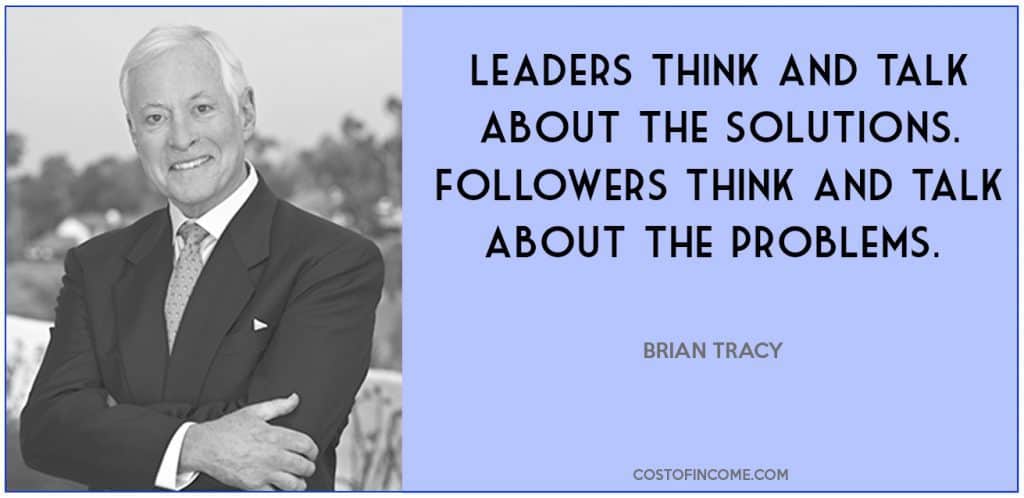
Being a leader is personal to your own situation. Most people look to step into a leadership role because they’re addicted to the feeling of success. As a leader, you have complete control over your successes – and, of course, your failures.
Instead of having to follow along with someone else’s ideas, you get to make your own. This is an enticing prospect for many future leaders.
While the goal of most leadership situations is the success of some form, there’s more to it than that.
Being a leader to you may also mean being in a position where you can ensure that others are treated fairly and equally. You might want to help the world with your leadership, by providing a product or a solution that will come in handy.
Or you might want to influence others to behave as you do. You might want to be known for achieving greatness, no matter how big or small.
Sit down and think about what it means to you to be a leader. Write a list of your top 5 to 10 things and store them in a safe place. This list will help to keep you grounded if you ever feel that you’re losing your way.
What are the 7 leadership styles?
The 7 leadership styles reflect the 7 most popular methods of leadership. Here’s a brief summary of each of them:
Autocratic leadership style
The autocratic leadership style is a style that gives full authority to you, the leader. You make all the biggest decisions yourself. Then you communicate them over to your team in the form of new rules and instructions.
Democratic leadership style
As a democratic leader, you allow team members to be involved in making big decisions with you. If your team members have the skill and experience to be a real help to you, this may be the leadership style for you.
Coaching leadership style
Coaching leadership is all about your behaviour. You’re more of a coach or a teacher to your team, supervising them and helping you to grow. In this case, your leadership style is considered coaching leadership.
Strategic leadership style
Strategic leadership is demonstrated by leaders who are able to make strategic decisions for their team. They can pursue that decision with the right actions, tools and equipment.
Transformational leadership style
Many leaders work towards leading in a transformational style. It is often considered the most desirable. Transformational leaders aim to produce a thriving workplace community. They do this teamwork and effective communication.
Laissez-faire leadership style
The French word “laisserz-faire” translates to “let them do”. This should give you an idea about what this type of leadership entails. For self-motivated, creative teams, this leadership attitude should work best.
Charismatic leadership style
If you’re great at charming people into following your incentives, you may have a charismatic leadership style. This leadership style is considered less desirable, though. It relies too heavily on you, the leader, rather than the efforts of a team.
What is leadership coaching?
Some people might want to become a leader one day, but they don’t feel that they can achieve a leadership role on their own. That’s okay, and if you feel this way, you’re far from alone – otherwise leadership coaching wouldn’t exist today.
Leadership coaching helps you to build your capability as a leader. The outcome is to achieve success in your role. You can receive personalized coaching to suit you. It is usually carried out one-on-one, with one coach and one mentor.
Leadership coaching is far from a sign of weakness. In fact, it’s thought that more than half of the Fortune 500 companies have a mentorship program which includes leadership skills.
There is only so far that education and training can take you. If you want to work on your own personal skills, leadership coaching will help you immensely.
When working with a leadership coach, you can learn how to solve problems more proactively. You can also set your priorities, anticipate future issues.
Coaching can even help you to step out of your comfort zone. You may be able to look into new objectives, set goals, and make plans of action.
Many people meet with their coach on a once or twice-weekly basis. They get “homework” and reading tasks to complete between.
Why is leadership important?
To understand why leadership is important, imagine what the world would be like without people with effective leadership skills.
We’d all feel entitled to create our own rules, and most likely, many of these rules wouldn’t be too acceptable. Nobody would listen to one another.
People would argue and fight and feel confused about the lack of direction. It would be chaotic to say the least. In fact, the world as we know it wouldn’t survive.
Good leaders establish a level of control in a certain situation. It can help bodies or organizations to impose strategies and achieve goals. In the world of business, leaders exist to propel a team towards success.
They can do so with far more efficiency, morale and productivity.
What is servant leadership?
Servant leadership is a conscious style of leadership. It focuses on creating a more caring environment. The term was coined by Robert K. Greenleaf in an essay written in 1970, called “The Servant as Leader”. In the essay, Greenleaf wrote: “The servant-leader is servant first…
It begins with the natural feeling that one wants to serve, to serve first. Then conscious choice brings one to aspire to lead.”
A servant leader uses their leadership strengths for the growth and wellbeing of their team and communities. Servant leaders aim to share their power. They do this rather than take on a “top of the pyramid” position above their peers.
What are the 3 theories of leadership?
There is no true definition of leadership. Many theorists have coined their own classification of the term. There are three theories that are the most popular today: the Great Man theory, the Trait theory, and the Transformational leadership theory.
The Great Man theory is the idea that a good leader is determined by the actions of an individual leader. It suggests that leaders are known for the things they achieve and the things they fail at.
The Trait theory suggests that if you have the ability to lead, it’s something you were born with. Not something you can adopt. It says that there are certain traits of a good leader.
Today, this theory is discredited. Instead, it’s considered that leadership comes from a combination of this theory and the Great Man theory together.
Transformational Leadership: leaders interacting with their peers to inspire one another to grow. In this, the theory demonstrates the difference between management and leadership.
What is transactional leadership?
Many leaders value structure and order. In fact, wanting to be in control is one of the characteristics of leadership. This is a good thing because it can come in useful in a leadership role.
Transactional leadership requires self-motivated individuals who can follow a set order. This order is advised by the leader. It works best in large corporations or military operations. But it doesn’t work so well in teams of creative individuals.
Transactional leadership focuses much more on the performance of individuals. It also looks at their ability to stick to a set process. It doesn’t inspire or motivate those individuals to change the world for the better.
For that reason, use transactional leadership only when no other leadership style can work better.
Conclusion
Now you know the answer to the question: what are the qualities of a good leader? You have learned about the qualities of leadership. You should also know more about leadership in general.
You’ll find that becoming a leader is closer within reach than you ever could have imagined. It truly is possible to learn the characteristics of a good leader.
There’s no need to take the opinion of “well, I wasn’t a born leader, so I’ll never get anywhere”. Remember that all the most important leaders, the people you look up to, are continuing to grow and better themselves today.
FAQ
Are leaders born or made?
While you can have traits leadership traits, most of the leaders personality is built through hardship and tough decisions.
Why is it hard to be a leader?
People prefer to follow someone. It is easier and with no responsibility. That is why being leader is hard. You must take all the responsibility upon yourself.
How do you become a leader?
Through knowledge and your own experience you must grow character trait that will make you a leader.
How can I become a leader in my group?
Take responsibility and make decisions. Most people are scared of it and will follow those who can do it.
Can leader be indecisive?
It can be argued that being unable to make a decision is worse than making a wrong one.
You might also be interested in a huge list of inspirational and motivational quotes, or possibly one more in-depth reviews of WebinarJam and its pricing.
